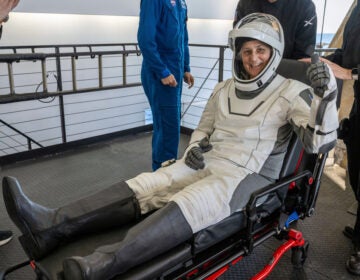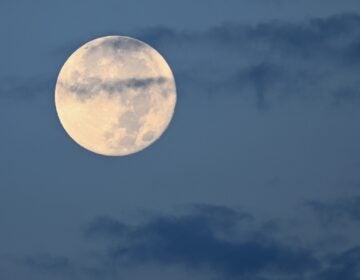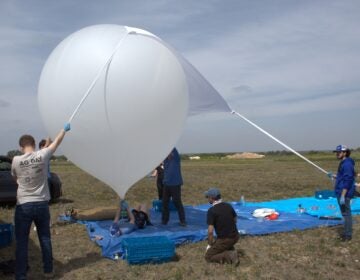Come One, Come All: No Telescope Needed
Listen 00:06:38Friday marks the 5th Annual city-wide Astronomy Night, which is the first event of the 2015 Philadelphia Science Festival.
Community centers are the core locations of this NASA-funded City Skies grant program – where kids have assembled telescopes provided by NASA to learn about what they can see in the night skies from their neighborhood and what great activities NASA has assembled at their activities website called NASA wavelength. Find out where in your neighborhood at philasciencefestival.org.
Franklin Institute Awards are Thursday, 4/24. Among the oldest and most prestigious comprehensive science awards programs in the world. Since 1824, 113 F.I. laureates have been awarded 115 Nobel prizes.
Lyrid Meteors – oldest recorded shower – in Chinese observing records in 687 BC – takes place this year Wednesday night into Thursday morning.
April 20, 2015
[Dave Heller] Come one, come all, and no telescopes needed. Friday marks the 5th annual city wide astronomy night. Here with a preview of the kick-off event of the Philadelphia Science Festival, Derrick Pitts, chief astronomer at the Franklin Institute, and Derrick, lets stress city wide, this viewing will be taking place in neighborhoods across the city.
[Derrick Pitts] Yes, thats the whole idea of this, this is one of those type of events where the science comes to you, in this case the astronomy comes to your neighborhood. We wanted to help people understand that no matter where you live in an urban environment, even though there is a lot of light at night that you may think makes it difficult for you to observe the skies, there’s still plenty of great of observing that can be done even with a telescope.
Now in this case “we” means the Franklin Institute with a little assist with an organization named NASA.
Ah, yes, actually quite a bit of assistance is provided by NASA because the NASA funded City Skies Grant Program, in which community centers receive batches of telescope kits, so that facilitators there can teach families in the neighborhood there how to build and use telescopes…these are the community centers that are the core locations for the city wide astronomy night. What we do is invite volunteers from the local astronomy clubs from all around us to bring their telescopes and go out to these locations, and if you haven’t seen what Jupiter looks like in a telescope or what the moon looks like in a telescope, it’s a wonder to behold any of these objects. We will have instruments of significant size out in all these locations for free observing.
Check out Philadelphia’s Science Festival website to find out where this is taking place in your neighborhood. Any chance with a keen I you’d be able to see leftovers of the lyrid meteors?
Haha, wouldn’t that be great if we could but of course meteors are too fast to be seen in telescopes. However, if we are simply out observing we might remnants of this shower which is registered as the oldest, recorded, observed meteor shower in history.
Pre Galileo?
Oh way pre Galileo, this is 687 B.C. and Chinese records observers caught a view of this particular shower at that time it was happening in March, so this was not the first time they observed it but it was the first time it was actually ever recorded. This is not the biggest meteor shower of all, it is actually on the small side, on 15-20 meteors per hour. They seem to be coming from the constellation Lyra, which is a summer constellation, which means this will be up by 10pm and directly overhead by 4am but these do have extremely bright members every so often. So if you happen to be out at that time Wednesday night into Thursday morning , maybe even Thursday night into Friday morning, you might be able to see some of these very bright meteors that seem to have a train or a trail that is persistent.
Again, Friday night is the kick-off event, astronomy night, what are some of the other events of the Philadelphia Science Festival?
Oh my goodness there are so many, more than 100 events happening all across the city. It doesn’t matter if you’re interested in food or chemistry or psychology or engineering, there are just so many events. And the partners that are involved come from all the science entities all across the city. What’s really exciting is this is probably the single event in which all of these entities get together, working together to bring science to the public of Philadelphia in a way that has never been done before. I think the Philadelphia science festival is a perfect example of how Philadelphia is just as much of a science city as it is a sports city.
So if you want to get your nose right into it, coming up on May 2nd is the Parkway’s Philadelphia’s Science Carnival. It takes place outside of the Franklin Institute, and on that day there will be more than 100 booths with all kinds of great activities for free.
Of course the Franklin Institute has been the focal point of science in Philadelphia for decades and decades and their awards on Thursday night proceeds the whole kick-off to the festival.
Yes, indeed it does, the science awards program that happens on Thursday that week actually is the culmination of events that have been taking place all week long, so we’ve had a group of brilliant scientists come to Philadelphia to receive the Franklin Science award medal.
WHYY is your source for fact-based, in-depth journalism and information. As a nonprofit organization, we rely on financial support from readers like you. Please give today.




